From Farage to Batten: What happened to UKIP's class of 2014?
- Published
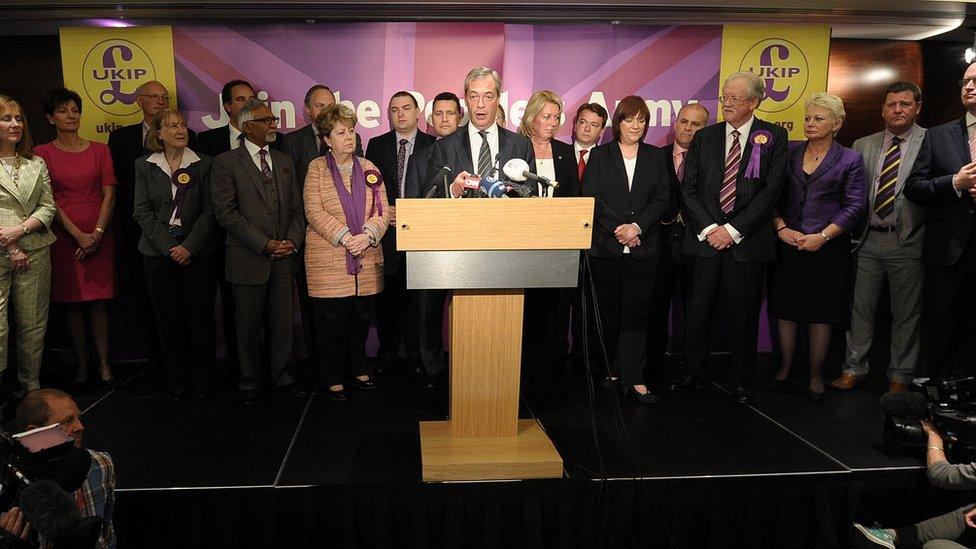
UKIP topped the polls in 2014 - but things have not gone to plan since then
In the 2014 European elections, UKIP defied expectations to become the largest British party in the European Parliament.
Twenty four UKIP MEPs were elected and the party won 27.5% of the vote - an achievement its then leader Nigel Farage described as "historic".
UKIP's success in these elections was one of the factors behind David Cameron promising a referendum on Brexit - as he feared losing more Conservative voters to UKIP.
However five years on from that election, only four of those 24 MEPs still represent the party.
So, where and why did they all go?
Post-referendum infighting: Expulsion, defections and a retirement
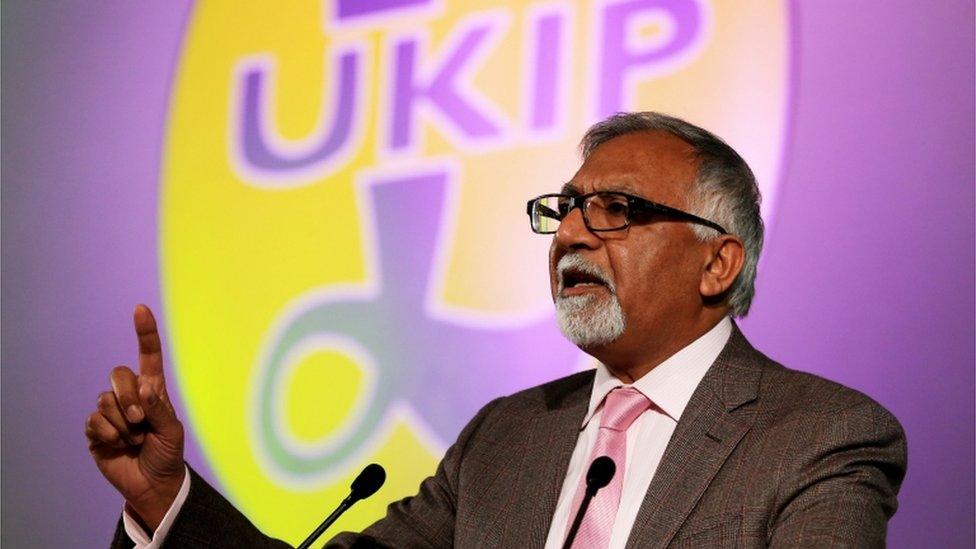
Amjad Bashir was the first MEP to leave the party
Less than a year after being elected as a UKIP MEP in the 2014 elections, Amjad Bashir defected to the Conservative Party calling UKIP "pretty amateur".
However, UKIP said he had been suspended over financial and employment concerns.
In March 2015 Janice Atkinson was expelled from UKIP for "bringing the party into disrepute" following a newspaper investigation into an apparent expenses claim.
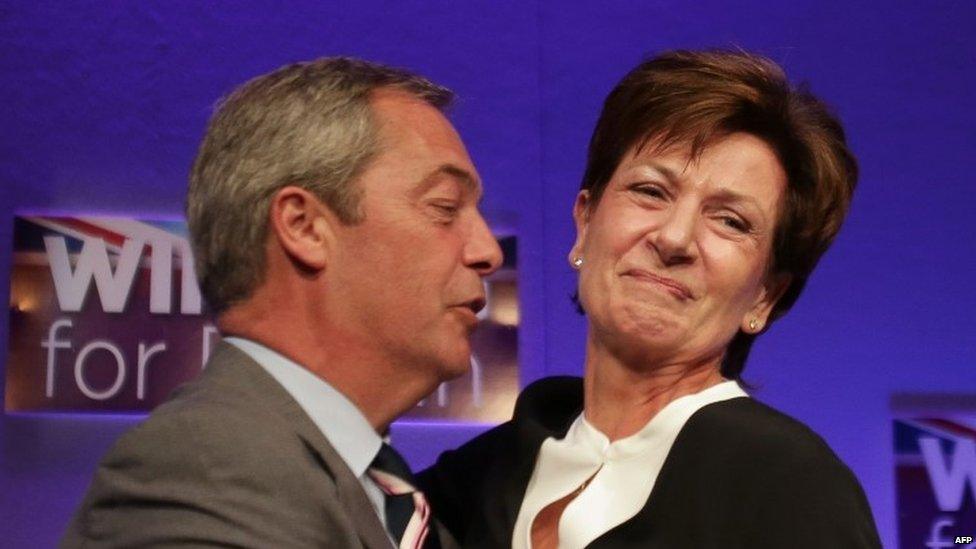
Diane James lasted 18 days as leader
Diane James's resignation followed a string of strange events in which she was elected leader of the party in September 2016 but stepped down just 18 days later - a move her long-serving predecessor Nigel Farage described as "yet another act of irrational selfishness".
Ms James, who now sits as an independent MEP, said it was "time to move on".
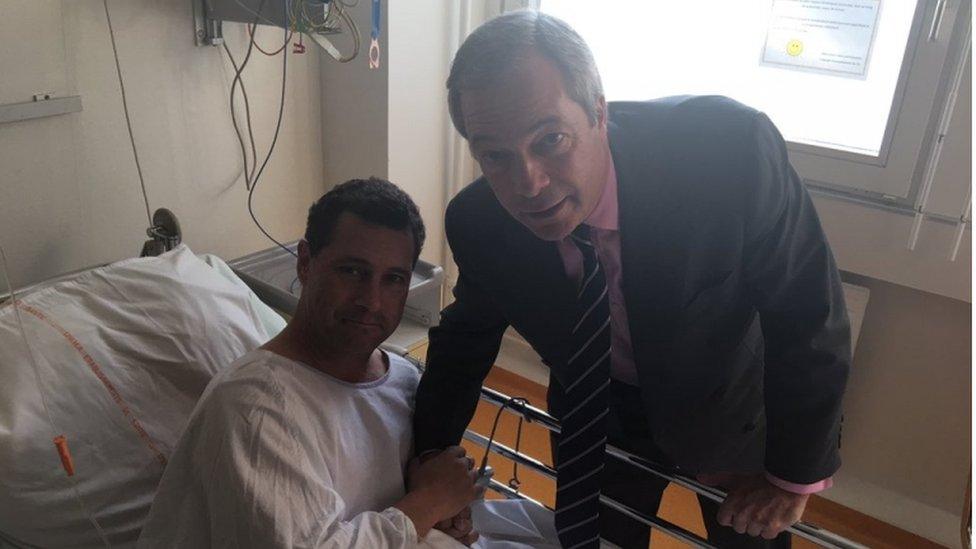
Steven Woolfe was taken to hospital following an incident with a colleague in the European Parliament
Another bizarre twist followed when would-be successor Steven Woolfe went to hospital following an altercation with another MEP in the European Parliament.
He quit UKIP soon afterwards claiming the party was "in a death spiral".
In July 2017 Roger Helmer said he was stepping down, telling the BBC "I think at the age of 73 I'm perfectly entitled to retire".
The Bolton era: 'Countless leaks, briefings and character assassinations'
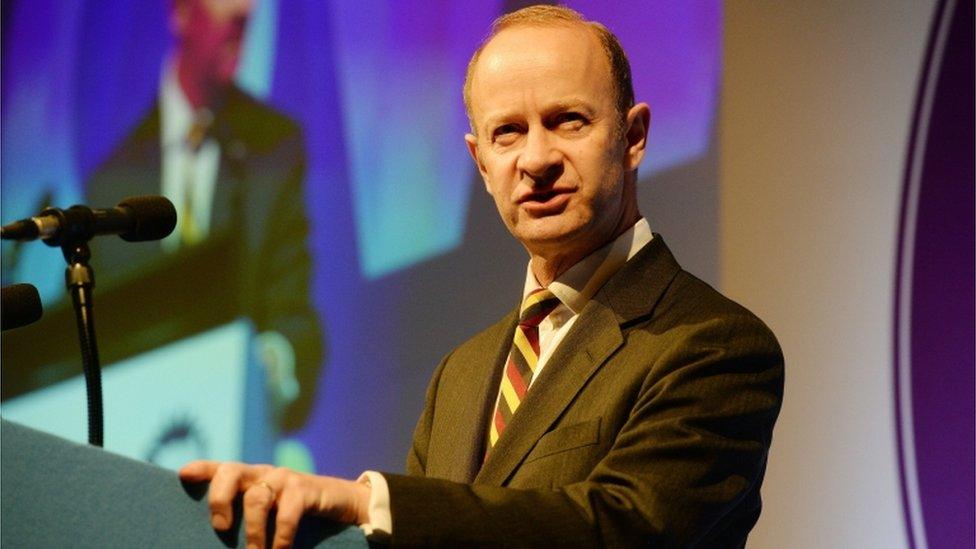
Henry Bolton was never an MEP and quickly lost the confidence of the party as leader
In September 2017, Henry Bolton became UKIP's fourth leader in 18 months - following Paul Nuttall's decision to quit after the party lost ground in the snap general election.
However he quickly became mired in a row over his personal life when his partner, Jo Marney, was reported to have sent racist texts about Meghan Markle.
The row prompted several senior UKIP MEPs to quit their posts in the party - and one MEP - Jonathan Arnott - to quit the party altogether.
Mr Arnott, the party's North East of England representative, described Mr Bolton as "not the right person for the job".
He also lamented the "unpleasant nature" of the party including "countless leaks, briefings and character assassinations".
Batten takes over: 'Increasingly out of kilter'
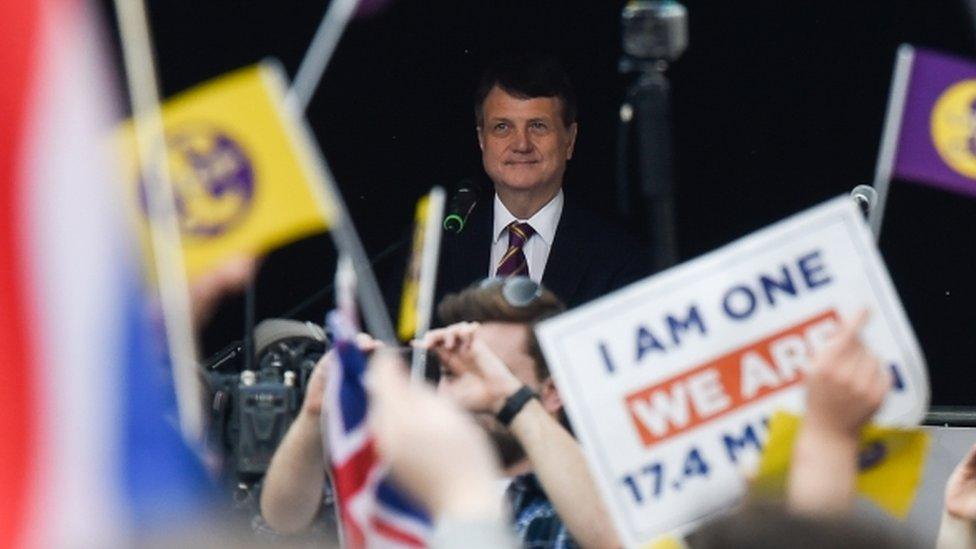
Gerard Batten's controversial reign has seen a drove of resignations
In February 2018, Mr Bolton was sacked as leader and replaced by Gerard Batten.
Mr Batten said he would "concentrate on doing all I can to restore the party's fortunes" but, under his leadership, eleven UKIP MEPs have quit the party.
In May 2018, West Midlands MEP James Carver announced his resignation, external writing: "I now find myself increasingly out of kilter with the party."
A year earlier Mr Carver resigned from his post as UKIP's foreign affairs spokesman in protest at the party's plans to ban the burka arguing "no-one has the right to dictate what people should wear".
In October 2018 Bill Etheridge left the party describing it as a "vehicle of hate towards Muslims and the gay community".
Gerard Batten said Mr Etheridge should "do the decent and honourable thing and resign his seat, thereby handing it back to UKIP to which it morally belongs".
Tommy Robinson hired: 'A catastrophic error'
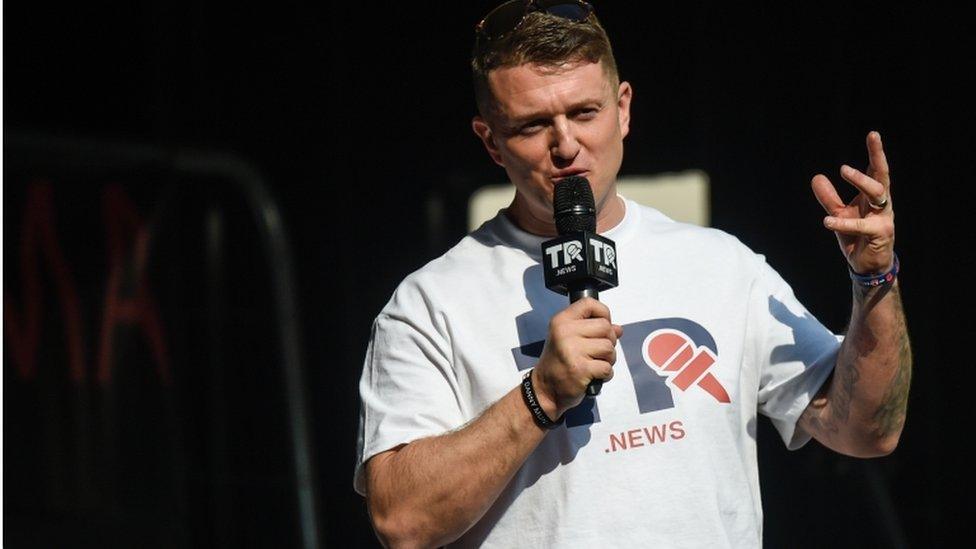
Mr Robinson was hired to advise UKIP on grooming gangs and prison reform
In November, Mr Batten caused outrage when he decided to hire Tommy Robinson as an adviser arguing that the ex-leader of the English Defence League was "a good person to have onside".
This prompted a wave of resignations.
In December, Nigel Farage told LBC he was quitting the party and accused Mr Batten of being "pretty obsessed with the issue of Islam".
Mr Nuttall followed him out of the door, saying "putting Tommy Robinson front and centre, whilst Brexit is in the process of being betrayed is, in my view, a catastrophic error".
He also said the party had "lost its way in recent times" and attacked its "clumsy, blundering approach" to tackling female genital mutilation and its "hardline anti-Islam messages".
Nathan Gill, one time leader of UKIP in Wales, said: "I can no longer belong to a party that has switched its primary focus from Brexit, to a foolish pursuit against Islam and the promotion of Tommy Robinson."
On 15 April 2019, three female MEPs - Jill Seymour, Jane Collins and Margot Parker - all quit.
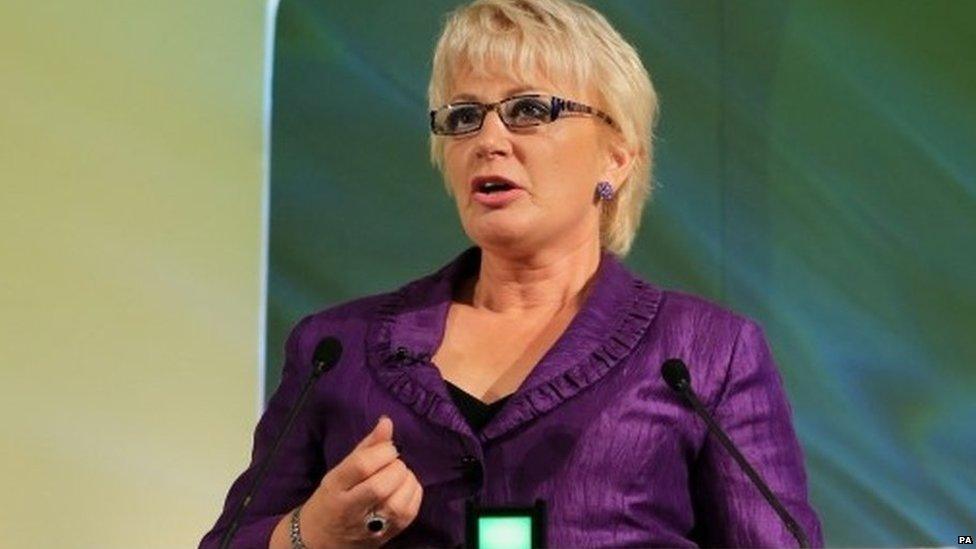
Jane Collins said the party's attitude to women was "disgusting"
Ms Seymour, who represents the West Midlands, said she was "not walking away from the party's original core principles, but the present party's direction means it has walked away from me, and its original membership".
Responding to her resignation, Mr Batten tweeted, external that her decision was driven by "sour grapes and hypocrisy".
Ms Collins, MEP for Yorkshire and the Humber Region, blamed UKIP's "disgusting" attitude towards women for her decision, saying Mr Batten's defence of an election candidate's rape comments as "satire" in a BBC interview had "made her sick to the stomach".
And Margot Parker, who represents the East Midlands, said she could not be part of Mr Batten's "distasteful regime any longer", saying he had "taken his eye off the ball" and was crusading on divisive issues.
The other MEPs to quit under Mr Batten's leadership are Lord William Dartmouth, Julia Reid, Patrick O'Flynn, David Coburn, Louise Bours and Tim Aker - many of whom were allies of Mr Farage.
According to the European Parliament website, Louise Bours left UKIP in November 2018 to become an independent MEP - however, she has made no public statement about her decision.
Where have they gone?
Ten sit as MEPs for the Brexit Party - a new group launched by Nigel Farage
Seven sit as independent MEPs
Amjad Bashir has joined the Conservatives
Patrick O'Flynn has joined the Social Democratic Party and is planning to stand as a candidate if there is a by-election in Peterborough
Roger Helmer has retired
Who is left?
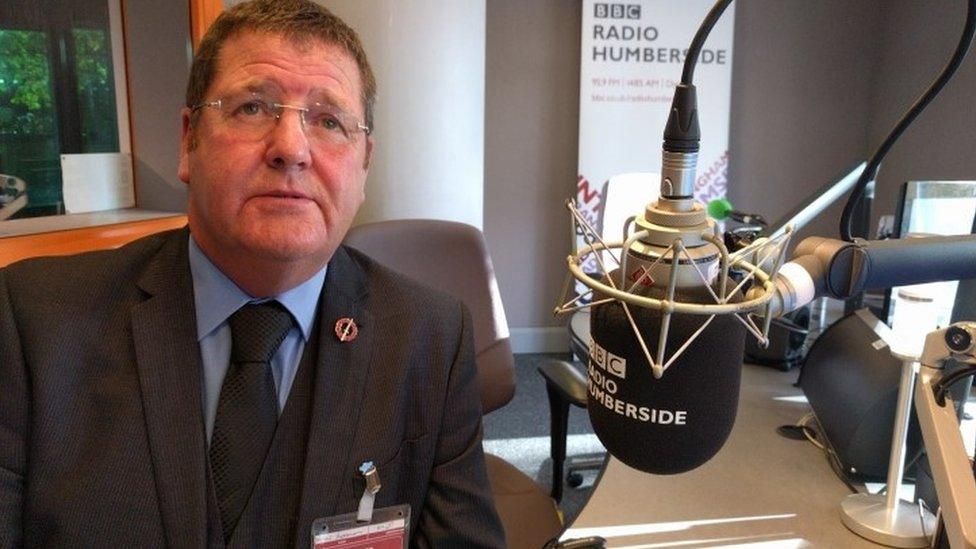
Mike Hookem is one of only three MEPs elected in 2014 currently confirmed as standing again
Of the 24 MEPs who were elected to the European Parliament in 2014, just four remain.
They are Stuart Agnew, Raymond Finch, Mike Hookem and their leader Gerard Batten. UKIP has confirmed that three of them - Mr Agnew, Mr Hookem and Mr Batten - have been selected to stand in the party's top tier of candidates this May.
When asked about the decline in his party's representation, Mr Batten said that many MEPs had left before he became leader .
In a statement the party said: "UKIP is entering the Euro elections with the three loyal MEPs who have honoured their commitments, alongside a fresh slate of candidates.
"We expect to win big."